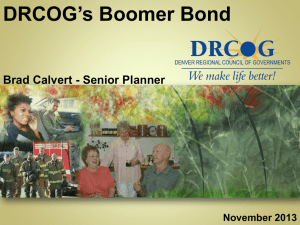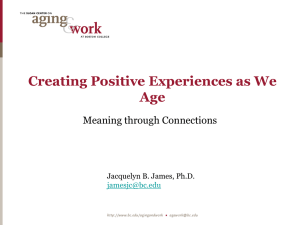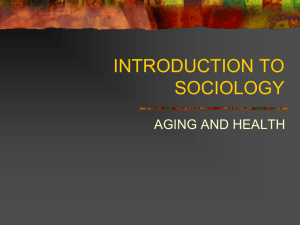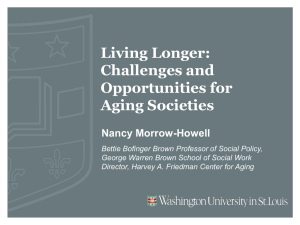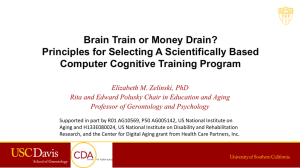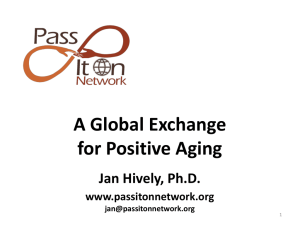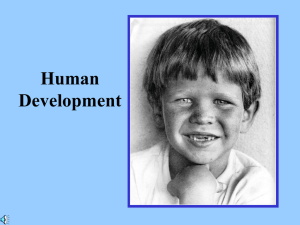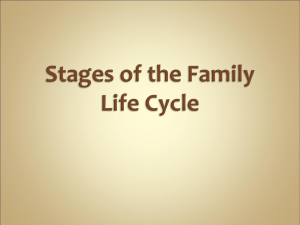Foundations of cognitive fitness
advertisement
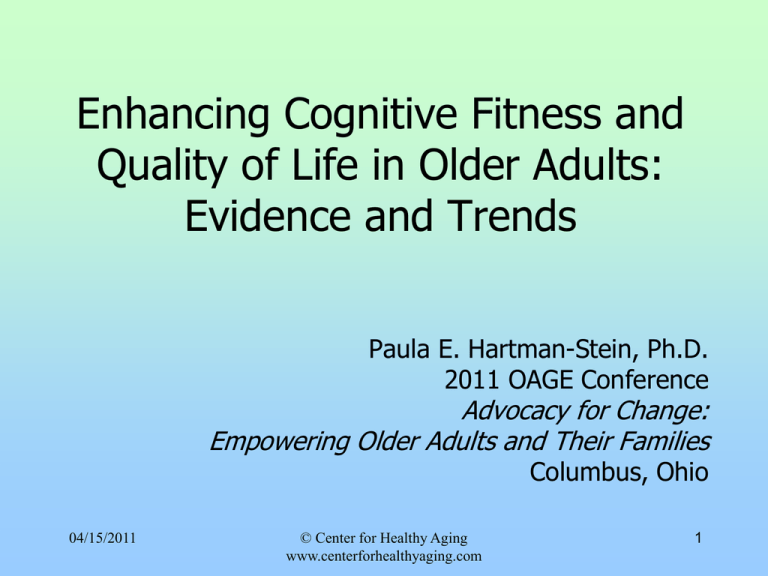
Enhancing Cognitive Fitness and Quality of Life in Older Adults: Evidence and Trends Paula E. Hartman-Stein, Ph.D. 2011 OAGE Conference Advocacy for Change: Empowering Older Adults and Their Families Columbus, Ohio 04/15/2011 © Center for Healthy Aging www.centerforhealthyaging.com 1 Objectives 1. Explain the research foundation behind cognitive enhancement programs. 2. Describe the evidence that exercise, meditation, and expressive writing enhance cognition and mood. 3. Highlight innovative community-based programs for improving cognitive fitness and quality of life of older adults. 04/15/2011 © Center for Healthy Aging www.centerforhealthyaging.com 2 Enhancing Cognitive Fitness in Adults: A guide for the use and development of community-based programs. (In press, Eds. Hartman-Stein, P.E. & La Rue, A., New York: Springer Science + Business Media) 04/15/2011 © Center for Healthy Aging www.centerforhealthyaging.com 3 Foundations of overall cognitive fitness Behavioral strategies: Evidence for aerobic exercise (Boot & Blakely) Evidence for meditation (Khalsa & Newberg; Kaszniak) Consumer-based fitness programs: “jury is out.” (Zelinski, Dalton & Smith) 04/15/2011 © Center for Healthy Aging www.centerforhealthyaging.com 4 Foundations of cognitive fitness Movement: 3 hours a week of brisk walking may halt or reverse brain atrophy. Exercise increases the brain’s volume of gray and white matter (connections between neurons.) 04/15/2011 © Center for Healthy Aging www.centerforhealthyaging.com 5 Foundations of cognitive fitness Exercise: Close to “behavioral magic”: aerobic exercise has been linked to better cognitive flexibility, long term memory, improvement of mood and reduction of anxiety. (Boot & Blakely) 04/15/2011 © Center for Healthy Aging www.centerforhealthyaging.com 6 Foundations of cognitive fitness In preliminary studies, older adults with memory problems are improving their cognitive functioning after an 8 week long program of meditation. Promising results for reduction of caregiver stress. (Khalsa & Newberg; Kaszniak) 04/15/2011 © Center for Healthy Aging www.centerforhealthyaging.com 7 Foundations of memory fitness “Efforts must focus on building a larger repertoire of strategies and skills that can enhance memory and on training that will help an individual decide what strategy will help him/her in a specific situation.” (Dunlosky, Bailey & Hertzog) 04/15/2011 © Center for Healthy Aging www.centerforhealthyaging.com 8 Approaches to memory fitness • Diagnosing the problem: What are you trying to remember? • In what contexts do you need to learn the info? • Time frame to learn it? 04/15/2011 © Center for Healthy Aging www.centerforhealthyaging.com 9 Strategies for memory efficiency • External reminder systems: From written lists and date planners to electronic calendars and reminders on cell phones and I-pads. • Explicit noticing and rehearsing • Elaboration, imagery, associations • Self-testing • Spacing practice 04/15/2011 © Center for Healthy Aging www.centerforhealthyaging.com 10 Community-based programs to sustain healthy cognition and well-being • HABIT at the Mayo clinic (Healthy Action to benefit independence and thinking): note-taking, physical and relaxation exercises, and emotional support. • Take Charge pilot program in Wisconsin, 8 sessions, 16 weeks; (La Rue) 04/15/2011 © Center for Healthy Aging www.centerforhealthyaging.com 11 Community-based programs to sustain healthy cognition and well-being • Peer led training programs (Ercoli, Cernin, & Small) • Senior guest programs at universities; Discussion groups in college classes (Cichy & Smith) • Osher Life-Long Learning Institutes (Alexander et al.) 04/15/2011 © Center for Healthy Aging www.centerforhealthyaging.com 12 National trends in cognitive fitness for older adults Intellectual Competitions: Odyssey of the Mind; adult spelling contests, e.g. AARP National Spelling Bee. (Stine-Morrow & Parisi; Hartman-Stein & De Forest) 04/15/2011 © Center for Healthy Aging www.centerforhealthyaging.com 13 Wellness programs in the community • Need for choice, e.g.—Keys to a Sharp Mind, model program at a retirement facility (Biermann & Hartman-Stein) • Behavioral support to increase adherence to the exercise protocol. (Potkanowicz) • Nutrition to promote brain health (Desai, et al.) 04/15/2011 © Center for Healthy Aging www.centerforhealthyaging.com 14 Wellness Programs in the community • Quilting and digital photography (Lodi-Smith & Park) • Oral Life Review (Meuser) 04/15/2011 © Center for Healthy Aging www.centerforhealthyaging.com 15 Community-based programs to sustain healthy cognition and well-being • Creative writing programs – Evidence of positive impact on working memory in young adults – Thoughts about ongoing stressful events are irrelevant demands that interfere with working memory capacity and expressive writing reduces their draw on working memory. 04/15/2011 © Center for Healthy Aging www.centerforhealthyaging.com 16 Creative writing benefits • Qualitative research study of older adults showed improvements: – Coping with conflicts – Increasing decision-making skills – Aid to memory – Problem solving – Contemplating life’s meaning/new level of consciousness or spirituality 04/15/2011 © Center for Healthy Aging www.centerforhealthyaging.com 17 Personal expressive writing: Effect on health and well-being • • • • • • Lowered frequency of physician visits Improved immune functioning Decreased blood pressure Reduced pain severity Improved depressed mood Reduced anger 04/15/2011 © Center for Healthy Aging www.centerforhealthyaging.com 18 Creative/expressive writing in groups • Guided autobiography • Understanding mind-body connections • Spiritual autobiography • Connecting with nature for health • Caregiving: Increasing compassion (Hartman-Stein, P.) 04/15/2011 © Center for Healthy Aging www.centerforhealthyaging.com 19 Supporting cognition and well-being in MCI • Focus on behavior and life style changes over pills • No one can be sure how lifestyle changes affect MCI. • Positive well-grounded activities help avoid excessive disability. 04/15/2011 © Center for Healthy Aging www.centerforhealthyaging.com 20 Supporting cognition and wellbeing in MCI • Early memory loss clubs (Fritsch et al.) • Montessori-based methods for engaging persons living with dementia (Camp, Zeisel & Antenucci.) • Brain brightening: Neurotherapy approaches (Thomas, L.T.) 04/15/2011 © Center for Healthy Aging www.centerforhealthyaging.com 21 National trends in community-based cognitive pursuits Creativity and the arts: “The Dancing Heart”: Vital Elders Moving in Community, Minneapolis, Minn. (Genne) Drama & Acting – Performance (Noice & Noice) 04/15/2011 © Center for Healthy Aging www.centerforhealthyaging.com 22 National trends: Cultural Pursuits Art, Museums and Culture: Hearthstone initiatives around the world.(Caulfield, S.) 04/15/2011 © Center for Healthy Aging www.centerforhealthyaging.com 23 National trends: Cultural Pursuits The Songwriting works model: enhancing cognitive fitness through collaborative musical composition and performance. (Friedman, J-K) 04/15/2011 © Center for Healthy Aging www.centerforhealthyaging.com 24 Community programs with a positive societal impact Voluntarism: Gaining cognition and well being through giving back – Experience Corps through Johns Hopkins Medical School (Rebok, et al.) – The Intergenerational School in Cleveland (George, D.) 04/15/2011 © Center for Healthy Aging www.centerforhealthyaging.com 25 Brain Activities Websites • Brain games available on the web without charge www.fitbrains.com/games • www.gamesforthebrain.com • www.freerice.com/index.php 04/15/2011 © Center for Healthy Aging www.centerforhealthyaging.com 26 Resources • Brain Fitness Blog www.sharpbrains.com • Kirtan Kriya meditation: www.alzheimersprevention.org 04/15/2011 © Center for Healthy Aging www.centerforhealthyaging.com 27
